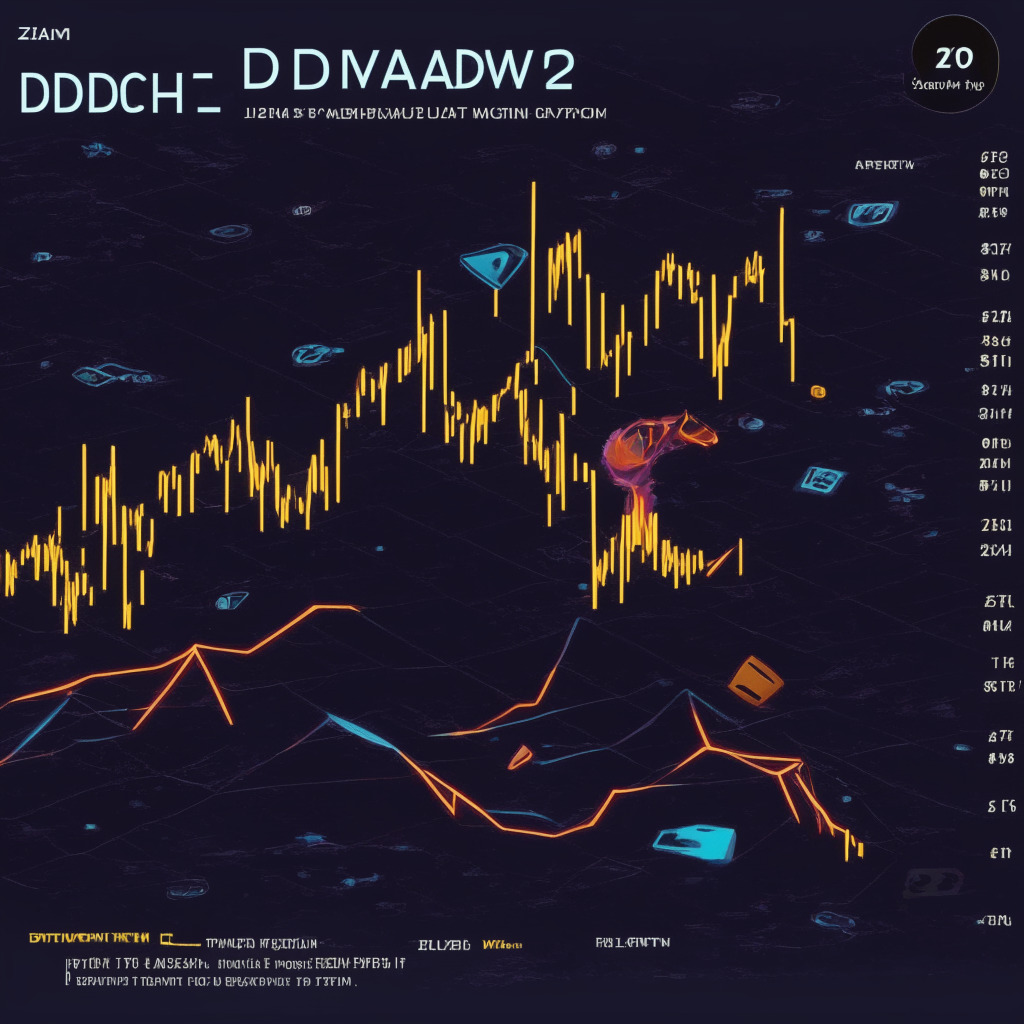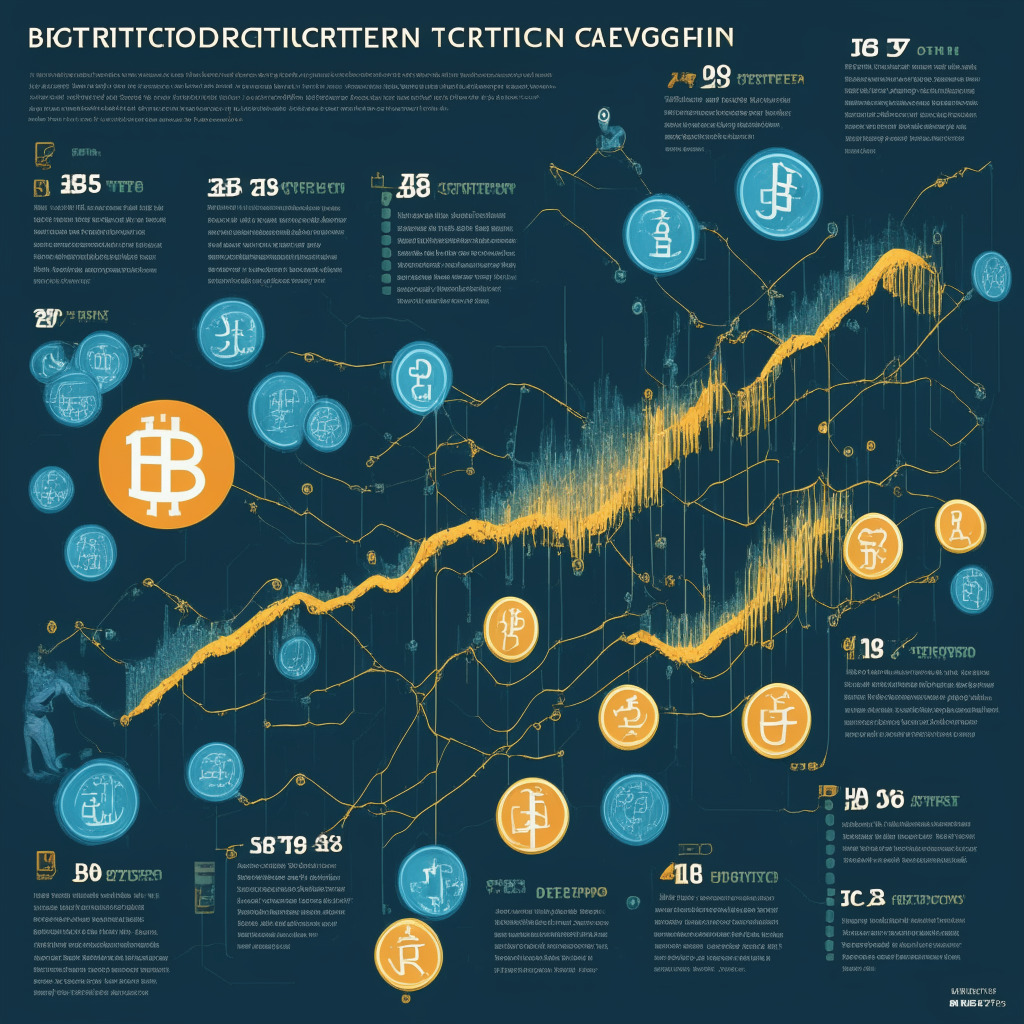Lamar Olive Oil has successfully issued an on-chain bond using Obligate, a Swiss DeFi platform, marking the first bond denominated in Membrane Finance’s EUROe. Built on the Polygon blockchain, Obligate aims to provide SMEs with a secure and transparent method of issuing, tracking, and settling debt. However, concerns around scalability, regulation, and security persist.
Search Results for: RSI
Bitcoin’s Price Rollercoaster: Analyzing Key Support and Resistance Levels
Bitcoin bounces back after testing the support level of $27,000, sparking speculation about its next target. This market overview delves into Bitcoin’s price dynamics, analyzes factors influencing its rebound, and explores potential price targets for traders to watch as the cryptocurrency faces a bearish trend.
Digital Asset Regulation: Bridging the Divide Between CFTC and SEC in Upcoming Congressional Hearing
US lawmakers will discuss “The Future of Digital Assets: Providing Clarity for Digital Asset Spot Markets” in a congressional hearing on June 6. Collaboration between regulatory committees like the CFTC and SEC is essential to address concerns in the digital assets space, focusing on effective guidelines and fostering innovation while safeguarding consumer interests.
MiCA Framework Debate: Striking a Balance for EU Crypto Regulations and Innovation
The Markets in Crypto-Assets (MiCA) bill has been signed into law by European Union officials, aiming to establish a consistent regulatory framework for crypto assets among EU member states. With regulations likely starting in 2024, the MiCA framework’s implementation could significantly impact balancing innovation and stakeholder protection in the crypto ecosystem.
Crypto Market Turbulence: Temporary Decline or Pessimism Here to Stay?
The cryptocurrency market experiences significant fluctuations due to market volatility, external factors, and regulation concerns. Despite downturns, long-term growth potential remains strong, with increased adoption, integration, and disruptive technology in industries like decentralized finance. However, security challenges persist, impacting investor sentiment.
TRC-20 USDT Surpasses Ethereum: Tron’s Success Amid Regulatory Challenges
TRC-20 USDT circulation reached a record high of $46 billion, surpassing Ethereum’s $36.8 billion and accounting for over 60% of USDT’s circulating supply. Tron’s ambitious goals for a $100 billion on-chain stablecoin market cap and preference among stablecoin users show promise, but potential regulatory challenges and legal risks must be considered.
Terra Luna Classic Collapse: Lessons Learned and Crypto Presale Opportunities Explored
Terra Luna Classic (LUNC) faces difficulties as its linked algorithmic stablecoin UST lost its 1:1 peg to the US dollar. The collapse of LUNA’s market cap destabilized the Terra ecosystem, leading to capital, user, and developer exodus. This prompts the need for investor diversification and exploring alternative opportunities like crypto presales.
Cryptocurrency, Fentanyl Trade, and Balancing Regulation: An In-Depth Analysis
Senator Elizabeth Warren highlights the connection between cryptocurrency and the Chinese fentanyl trade, proposing the Digital Asset Anti-Money Laundering Act to halt such transactions. Striking a balance between security and innovation is crucial in regulating the blockchain and digital asset sector.
StepStone Group’s $96M Blockchain PE Funds: Boon or Bane for Crypto & Investment Landscape?
StepStone Group has raised $96.54 million for two blockchain-focused private equity funds, highlighting increased interest in digital assets and blockchain technology. The funds’ allocation and strategies remain uncertain, raising questions about their impact on the blockchain ecosystem and private equity investors.
DAO Maker’s Downtrend: Analyzing Oversold Signals and Launchpad XYZ’s Potential Impact
The DAO Maker price experiences a downward trend since falling below its 100-day moving average. The RSI indicates oversold conditions, suggesting a potential reversal. Meanwhile, Launchpad XYZ’s ongoing pre-sale of $LPX tokens and its web3 platform development offer attractive investment prospects for early adopters.
US Debt Ceiling Deal: A Mixed Blessing for Crypto – Debating Pros, Cons & Implications
The US debt ceiling deal has omitted crypto-related proposals like the DAME tax, offering a reprieve for the crypto industry. However, it provides no clear direction on future regulation, making it essential to monitor political developments impacting cryptocurrencies.
HKMA and CBUAE Partnership: Epicenter for DeFi Growth or a Conflict Catalyst?
The partnership between Hong Kong and UAE’s central banks marks a significant step in crypto regulation, focusing on virtual assets regulations, financial market connectivity, and infrastructure development. This collaboration aims to advance innovation in their financial sectors and potentially shape the future of crypto regulation globally.
Cryptocurrency Rollercoaster: The Future Amid Fluctuations and Divergent Opinions
Cryptocurrencies face significant fluctuations, raising questions about their stability and long-term potential. Despite a promising future due to blockchain’s increasing acceptance, concerns persist regarding regulatory frameworks, price volatility, environmental impact, and the performance of smaller digital assets.
Bullish Patterns in Cardano, Solana, and Uniswap: Analyzing Market Entry Opportunities
This article discusses the bullish patterns in Cardano, Solana, and Uniswap which could potentially trigger significant price upswings. However, the author advises caution and thorough market research before investing, as market conditions remain uncertain and volatile.
Binance’s Talent Density Strategy: Pros, Cons, and the Future of Crypto Exchanges
Binance, the world’s largest crypto exchange, is prioritizing talent density in its organization to ensure the right expertise in critical roles. Despite potential job cuts, this strategic move aims to enhance productivity, efficiency, and long-term market leadership while adapting to the evolving crypto landscape and regulatory requirements.
Yuan Depreciation vs Dollar Strength: Impact on Bitcoin and Global Crypto Markets
China’s yuan (CNY) experienced a 2.7% depreciation against the U.S. dollar (USD) this month, historically considered bullish for alternative assets like bitcoin and gold. However, the strengthening U.S. dollar could lead to continued monetary tightening worldwide, posing a headwind for risk assets, including cryptocurrencies.
Anoma Foundation’s $25M Funding Boosts 3rd-Gen Blockchain: Will Intent-Centric Tech Outshine Ethereum?
Anoma Foundation secures $25 million to develop its third-generation blockchain architecture offering increased composability and ease of use. Focusing on intent-centric design, Anoma aims to further decentralize existing blockchain-based applications and platforms, enhancing decentralized applications (DApps) and services, such as decentralized exchanges and rollup protocols.
Bitcoin’s Downturn: Analyzing the Channel Pattern and Potential Collapse Below $26,000
The Bitcoin price saw a downturn on May 29th, suggesting a corrective path with a possible drop below $26,000. Increased selling pressure during price rallies and bearish market sentiment contribute to this outlook. Watch for impacts on Bitcoin’s future trend and always conduct thorough market research before investing.
Cryptocurrency Turmoil: Navigating Regulatory Shifts and Unexpected Market Surges
Cryptocurrencies face a bear market due to Federal Reserve’s tightening monetary policies, causing Bitcoin to drop 3% within 24 hours. Meanwhile, the CFTC issues warnings for companies to counter risks in clearing digital asset transactions, and XRP sees an 8% increase in value amid settlement speculations in the SEC/Ripple legal case.
DOJ May Drop Charges Against Ex-FTX CEO: A Win for Crypto or Loophole for Criminals?
The U.S. DOJ might drop charges against former FTX CEO Sam Bankman-Fried due to potential violations of the extradition agreement with the Bahamas. This highlights complexities and challenges in balancing crypto innovation with safety and regulations across global jurisdictions.
Detainment of CNHC and HKDC Stablecoin Team: Navigating Blockchain’s Regulatory Complexities
The detainment of the stablecoin team behind CNHC and HKDC by Shanghai police raises concerns about the future of stablecoins and their standing within regulatory frameworks, highlighting ongoing tension between centralized financial oversight and decentralized cryptocurrency systems. The contrasting regulatory stances between China and Hong Kong reveal a larger issue that investors face when navigating the digital currency landscape.
Ethereum Scaling Meets Telecom Giant: Exploring Polygon and Deutsche Telekom Partnership
Deutsche Telekom partners with Ethereum Layer-2 scaling platform Polygon, joining as one of the 100 validators on its Proof-of-Stake (PoS) network. The collaboration aims to improve the Ethereum ecosystem and strengthen Polygon’s protocol security, governance, and decentralization, attracting attention across multiple industries.
XRP Rally Amid SEC Case: Prospects, Risks, and Alternative Investment Options
XRP price gains by 1% amidst market-wide decline, signifying an 11% increase in the past week with expectations of a positive verdict in Ripple’s SEC case. Ripple’s recent Metaco acquisition and growing market confidence may lead to a massive rally, while diversifying with alternatives like Wall Street Memes could maximize gains.
SEC Crackdown on Influencer Fraud: Market Manipulation and Ensuring Transparency
The SEC is intensifying efforts to identify crypto influencers involved in promoting scams and manipulating token prices on social media. Former SEC Chief John Reed Stark warns of potential persecution and emphasizes that anti-fraud rules apply to all forms of price manipulation, including crypto-securities. Influencers must carefully vet projects, avoid price manipulation, and maintain transparency to ensure legal safety and trust.
Crypto Market Decline: Asia Trading Hours Impact and Future Predictions
The global crypto market experienced a decline, with Bitcoin and Ethereum dropping 2%. Investors have been liquidating holdings as Bitcoin’s price closes 8% lower for the first time this year. Despite bullish outlooks, a short-term decline is expected due to a debt ceiling deal prompting a T-bill issuance from the US Treasury Department.
Nansen Layoffs and Crypto Industry Challenges: Adapting to Market Volatility and Uncertainty
Nansen, a blockchain analytics platform, recently announced a 30% workforce reduction due to rapid scaling beyond their core strategy and the ongoing crypto bear market. This raises concerns on the sustainability of businesses within the crypto industry and the impact of market fluctuations on workforce stability.
Balancing Blockchain Anonymity and Legal Investigations: Pros, Cons & Conflicts
Researchers from Friedrich-Alexander-Universität Erlangen-Nürnberg propose a standard framework containing five argumentative schemes for validating deanonymized data on the Bitcoin blockchain. This aims to balance protecting suspects’ rights and aiding investigators by providing transparent, analytically sound court proceedings and ensuring fair law application. The findings are potentially applicable beyond German and United States legal systems.
Crypto Insider Trading Case: Impact on Regulation and Trust in the Industry
Former Coinbase manager Ishan Wahi and his brother Nikhil Wahi settled with the US SEC over allegations of insider trading involving cryptocurrencies. The case highlights ongoing concerns about insider trading in crypto and the complexities of achieving a balanced regulatory framework.
El Salvador’s Bitcoin Experiment: A Landmark Move or Destined to Fade Away?
El Salvador made history by adopting Bitcoin as legal tender, aiming to mitigate negative impacts of being tied to the U.S. central bank. Facing challenges like skepticism and fluctuating prices, the country’s Bitcoin experiment has inspired others but leaves its future undetermined.
Balancing Crypto Regulation: The Wahi Brothers’ Settlement and Future Implications
The Wahi brothers’ settlement with the SEC over insider trading of crypto assets sparks conversation about regulating cryptocurrencies. Striking a balance between investor protection and innovation is crucial, as appropriate regulations should maintain market integrity without hindering emerging blockchain technologies and cryptocurrency markets.
Insider Trading Case in Crypto: A Cautionary Tale for the Industry and Regulation Debate
The Wahi brothers recently settled insider trading charges with the SEC involving non-public information about nine crypto assets soon to be listed on Coinbase. This case highlights the importance of proper regulation, oversight, and ethical conduct within the rapidly growing crypto industry.
Shiba Inu’s Struggle: Eyeing Breakout or Prolonged Decline? AI Crypto Tokens on the Rise
The Shiba Inu (SHIB) cryptocurrency has been trading sideways recently, with its 21-day moving average acting as a magnet. AI-linked cryptocurrencies like RNDR, AGIX, and YPRED, however, have experienced significant gains and offer potential market advantages with their AI-powered platforms for trading signals, sentiment analysis, and pattern recognition.































